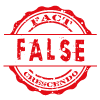
A social media post claimed that Costco uses a carcinogenic substance called Carrageenan in its rotisserie chicken.
A user wrote, “100 million cancer causing chickens packed with carrageenan, A KNOWN CARCINOGEN, sold in Costco’s every year.”
Another user tweeted, “Costco. I scanned one of your products on Yuka US and it contains additives assessed as high-risk (Sodium phosphate, Carrageenan). I ask you to remove them in order to protect consumer health.”
Fact Check-
We checked the ingredients of seasoned rotisserie chicken available on Costco website. We found that the product contains 88% chicken, water, and 1% marinade which includes salt, maltodextrin (from maize), vegetable gum, flavour, pepper and mineral salts with code no. 450, 451 and 452.
Mineral salt 450, 451 and 452 are different from carrageenan. Carrageenan is numbered as E 407. While mineral salts 450, 451, 452 and Carrageenan are food additives, they serve different purposes and have distinct chemical compositions. While above mentioned mineral salts falls under the chemical category Phosphates, Carrageenan is Polysaccharide.
What is Carrageenan?
Carrageenan is a natural polysaccharide derived from red seaweed. It is also known as known as carrageen moss, Irish moss, and carraigin. It is a vegan alternative to gelatin, and used as a thickening agent. It is commonly found in products like chocolate milks, processed meats, toothpastes, air freshener gels etc.
According to FDA, Carrageenan is a food additive made from specific types of red seaweed, such as Chondrus crispus and Eucheuma cottonii, and is approved for use as an emulsifier, stabilizer, or thickener in foods, except in standardized foods where such use is not permitted. It is a sulfated polysaccharide with a sulfate content of 20-40% on a dry weight basis. To ensure safety, products containing carrageenan must clearly label it as “carrageenan.”
As per National Library of Medicine’s report, food-grade carrageenan has a large molecular weight and is not absorbed by the body. It remains stable in the digestive system. Studies show that carrageenan does not cause cancer or promote tumors, and its effects on the immune system are not relevant to its oral consumption. Poligeenan, a degraded form of carrageenan, is not a food additive and has different toxic properties at high doses. Toxicological studies on carrageenan at very high doses (much higher than human exposure) show no harmful effects. International food safety organizations, like JECFA, have reviewed carrageenan and consider it safe for consumption with no specified daily intake limit.
EFSA evaluated the food additive carrageenan (E407) and processed Eucheuma seaweed (E 407a). These substances are similar in structure, so they were assessed together. Studies show that carrageenan is not absorbed by the body, is not toxic even at high doses, and does not cause cancer or genetic damage. Processed Eucheuma seaweed is considered equally safe. However, there are uncertainties about its chemistry, exposure levels, and some biological data. Because of these gaps, the current acceptable daily intake (ADI) of 75 mg/kg body weight per day is set for a temporary period. The organization is continuing its research on carrageenan.
Conclusion:
Fact Crescendo found the claim to be false. FDA, EFSA and other food safety organizations had conducted studies and found the Carrageenan does not get absorbed by the body and is not toxic or carcinogenic or causes any genetic damages.

Title:Carrageenan in Costco Rotisserie Chicken is not carcinogenic. Carrageenan is approved as a food additive by regulatory bodies.
Fact Check By: Siddharth SahuResult: False


